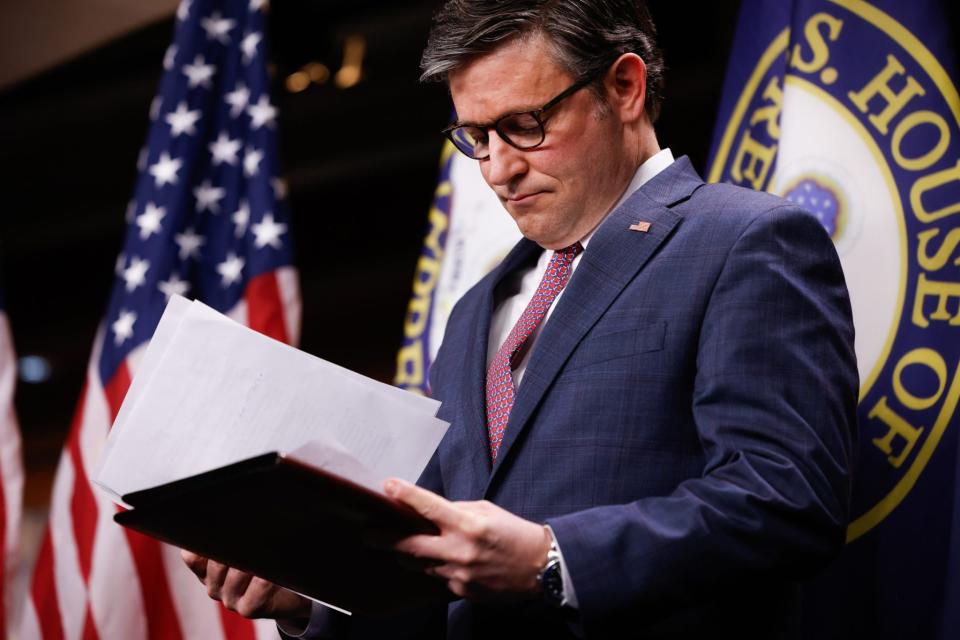Time is running out for Section 702, which lets U.S. intelligence demand data from Big Tech

Last September, I wrote about the battle to reauthorize Section 702 of the U.S. Foreign Intelligence Surveillance Act, the legal basis that intelligence agencies use to force Big Tech to hand over users’ communications without a warrant. It’s supposed to be used to spy on foreigners—NSA whistleblower Edward Snowden made sure the world knew about that use case—but White House privacy advisors made clear at the time that Americans’ communications are also often scooped up.
Section 702 was due to expire at the end of last year, but Congress allowed a short-term extension to April 19, without giving it a full-blown reauthorization. And yesterday, House Speaker Mike Johnson (R-La.) again tried and failed to get Section 702 reauthorized, with the House voting against even debating it.
That means, unless something drastic happens in the next week, the War on Terror–era surveillance program could actually die in the foreseeable future. But because Section 702 permits the intelligence services to also get annual court approval for these data handovers, and they won that approval in recent weeks, the handovers would continue for nearly another year.
So what happened? Two things: Johnson chose to go with a reauthorization bill that critics say would have weakened rather than strengthened oversight of Section 702 surveillance; and former President Donald Trump wants FISA annihilated.
Let’s talk about Trump first, although his influence here is debatable (more on this below). MAGA Republicans are incensed that the FBI used FISA, in part improperly, to spy on former Trump staffer Carter Page. Section 702 had nothing to do with this episode, but never mind: Trump posted “Kill FISA” on his Truth Social platform hours before yesterday’s vote, which may have helped 19 Republican representatives decide to go against Johnson. (The Republicans control the House, but only barely.)
As for what lawmakers were voting on, that would be the Reforming Intelligence and Securing America Act, or RISAA. There were other compromise bills that would have closed major loopholes in the program’s oversight. They would have required warrants when intelligence operatives wanted to search Section 702 for Americans’ communications, and stopped them from simply using data brokers to get American targets’ data without a warrant. But Johnson went with RISAA, which civil society organizations said would “further erode Americans’ right to privacy”—and he nixed an amendment that would have at least closed the data broker loophole.
Elizabeth Goitein, a codirector of the Liberty & National Security Program at the Brennan Center for Justice, said on X that the bill failed not because of Trump, but because of Johnson’s decision to “block reforms demanded by members and by the American people.”
“The message is clear. If the [intelligence community and intelligence] committees want the government to continue collecting and reviewing foreigners’ communications under Section 702, they must end their insistence on allowing the government to conduct warrantless searches for Americans’ communications,” Goitein tweeted.
Goitein’s thread is worth reading, as is this piece for Bloomberg Law by Phil Kiko, a former House Judiciary Committee general counsel who was one of the architects of Section 702. He’s previously warned that letting Section 702 expire would “turn the keys” of surveillance over to whoever is in the White House. But here he argues that the provision’s use “has strayed further and further from its original legislative intent,” and it shouldn’t be renewed without “more robust safeguards to prevent dragnet use … to conduct surveillance on Americans.”
So stay tuned to see what happens next. More news below.
David Meyer
Want to send thoughts or suggestions to Data Sheet? Drop a line here.
This story was originally featured on Fortune.com

 Yahoo Finance
Yahoo Finance 